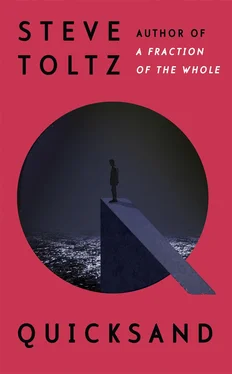‘Toss it.’
He took another bite instead and went off on some tangent about how lame it was to be a guy sitting around waiting for girls to give us the thumbs-up, about how they got to be indoctrinated into womanhood by their own bodies whereas we had to reach manhood by performing some arcane task like going to war, or else had it forced upon us by violent and energetic sadists. I knew Aldo’s horror of turning eighteen was twofold: the weirdness of approaching adulthood while his once older sister stayed ever young, but more pressingly — his persistent virginity; he had been such a late bloomer that Leila had dragged him to a paediatric endocrinologist who blithely insisted he take his constitutional delay on the chin. By the time he was developmentally ready, he was so besotted with Stella that it had to be her or nobody, and that was the real source of his anxiety, because he still had no firm opinion on whether she liked him in that way , even though she had held his hand at Henry’s funeral, accompanied him and Leila to the airport to await Veronica’s repatriated body from Indonesia, and afterwards, with Henry and Veronica gone, when Leila and Aldo packed up everything and moved away from the Benjamin Sprawl into their fishbowl-like ground-floor apartment on the other side of the city, on most afternoons either Aldo or Stella would make the hour-long journey to see the other, to smoke pot, sneak into concerts, hang out at Luna Park, break into neighbours’ hot tubs on starry nights. Or Aldo would thread through the dense clot of tourists at Darling Harbour to watch Stella playing a ‘gig’, that was really just her busking without a licence outside the ferry terminal. Personally, I found her voice grating and her lyrics impossible to understand — the only one I’d caught was about her dream of fucking a toll-booth operator in his place of business — but when I articulated my critique Aldo snapped back, ‘Stella gives voice to the voiceless.’
I said, ‘Only she says things the voiceless would never say.’
He said, ‘She said that meeting me was like finding money in an old pair of pants.’
I said, ‘See, I don’t know what that means.’
It seemed to me that Stella was so dedicated to her vocation that if she and Aldo ever got together, her self-reliance would doom their relationship, as Aldo at that time was not dedicated to anything except Stella herself. There was also the unavoidable fact that while we were still wrestling our way out of childhood, Stella seemed fully adult. To accentuate this impression, she’d eccentrically give her friends a key to her house, since she kept losing hers — she said giving away copies was ‘easier than trying to change your personality’—she drove a dented Ford Falcon GT, wore corduroy and leather and denim, all together; and when she wasn’t writing songs under a tarpaulin strung with fairy lights in the ferny backyard of her rambling house, she gave private guitar lessons to children and businessmen. And she had a high turnover of mentors she slept with: older, bearded guitarists who gave her hickeys that looked like attempts at strangulation. Aldo frantically insisted on ‘advising’ her on these relationships; even while hauling around her amp and microphone stand like a Sherpa, he found ways to subtly run down or undermine her boyfriends. He was weirdly attuned to a person’s insecurity and embarrassing habits and likely sources of shame. This is probably where he developed his rudimentary skill-set in psychological manipulation — he found he could turn her opinion on a dude in one conversation.
So: Aldo and Stella locked arms when they walked; she would wipe her mouth with his sleeve after she ate; they played footsies; she’d often rest her hand on his knee when she talked. Now, he said in a declamatory manner on the toilet block roof, he needed ‘the matter settled’. He itemised her finer points, including how she ‘enjoys scaring strangers with hiccups’ and ‘yields to any suggestion whatsoever’. His favourite thing on earth was ‘when she’s sparking a cigarette at night, her face lit by matches in the dark’. I couldn’t take much more of this. ‘And the way she walks!’ he shouted. OK, I knew what he meant — in those days we often fell in love with girls because of their postures; some girls have such straight backs it drives you crazy — but still.
‘Soooo, I was thinking,’ he said, tossing me a cigarette I hadn’t asked for. ‘ You should have a party so I can invite her and, you know.’
‘Why my place?’
‘Didn’t you say your folks were away? And you have no neighbours.’
It was true. We had just moved into an overlandscaped estate in a newly created suburb with identical streetscapes and pink concrete driveways and paved patios and brick-plinth letterboxes. Most houses had been sold off the plan but we were the first in, and there would be no further residents for four weeks. ‘What if nobody comes?’ I said in a near-whisper, and then, thinking of the epic party hurricanes that had legendarily decimated teenagers’ homes, added, ‘Or too many?’
‘Jesus, Liam, no one’s asking you to go swimming with sharks during your menstrual cycle,’ Aldo said. ‘A little get-together. That’s all.’
THE SIGHT OF MY RUINED HOUSE WAS COMPELLING. The skylight smashed from below. The broken banister, suspended. Downstairs, every window shattered. A human-shaped hole in the plasterboard. The floor a minefield of glass and shredded gyprock. My uncle’s urn on its side, emptied of its contents. Graffitied walls. Tiled kitchen floor sticky with beer, red wine collected in the grout. Cat wearing my old McDonald’s hairnet. Whatever carpet or curtains or couches remained carried the stench of cigarettes woven into the fabric. The front gate was all hinges and no gate, the pink driveway had been torn up, the Hills Hoist wrestled to the ground, the lemon tree set on fire, the letterbox kicked over, flowerbeds trampled flat. There was nothing left to protect. I remember promising my mother I would do the dishes.
It had started poorly enough. Aldo and Ben Stack were sitting on the bottom step of the verandah pretending not to notice that the street around us was abnormally quiet, as if even the cicadas had gone to a different party. ‘Who wants a cup of tea?’ Aldo asked. ‘Your grandmother,’ I answered. He rose and moved towards the kitchen and I said, ‘Fuck, Aldo, if anyone comes in here and sees you making tea …’
Two hours later, the living room was too crowded to move in; chairs, coffee tables and bookshelves had been repositioned and stacked carelessly to make room for dancing; people were stamping like horses trapped in a burning barn. Etiquette seemed to dictate putting cigarettes out directly on the coffee table rather than into the burgundy Persian rug. There were guys and girls piggyback jousting, kicking in sideboards, mowing the carpet, trampolining face first into the wrought-iron chandelier, pouring turpentine into the fish tank, pulling insulation out of the walls, and generally taking out their own puberties on the physical structures around them. Outside, teenagers jumping on cars, pulling the back door off its hinges, ripping up artificial turf, cannonballing off the pitched roof into our above-ground pool. It seemed that high-functioning sociopaths were flocking from all over Sydney. It got worse. Silhouettes of gangly marauders on the lopsided roofs of the neighbours’ empty McMansions; plummeting roof tiles; the doors in the street piled up in flames; jeering boys launching beer bottles at the streetlamps and porch lights; every last gravel stone in the driveway hurled through every window. I remember crossing our lawn where unconscious ladies were lit by the moon to sit weeping at the gutter’s edge, and being worried about Aldo, who was lost in this somewhere, and furious that my best friend had deserted me in what was unmistakably my hour of need.
Читать дальше











